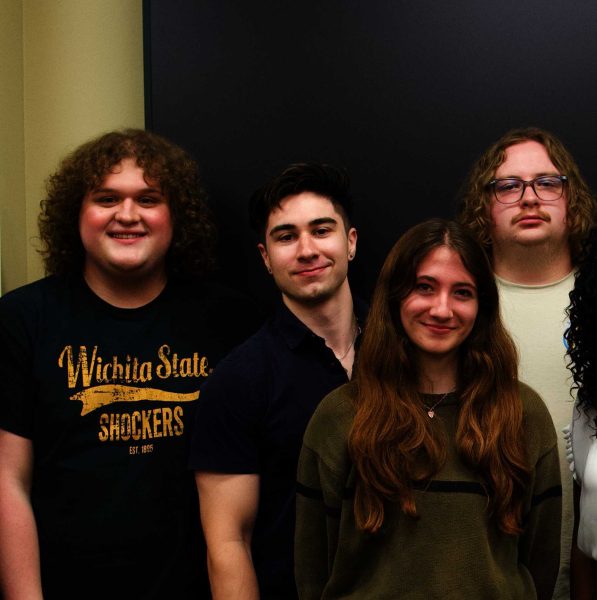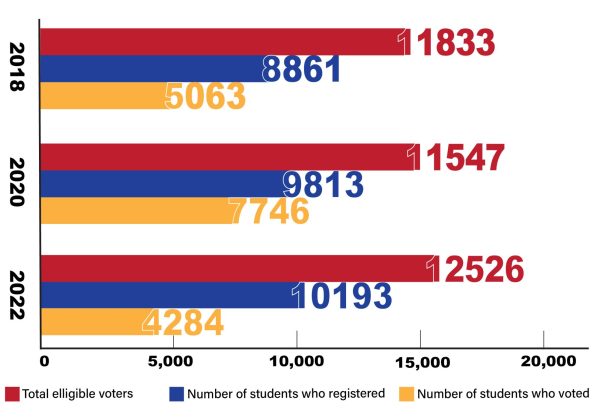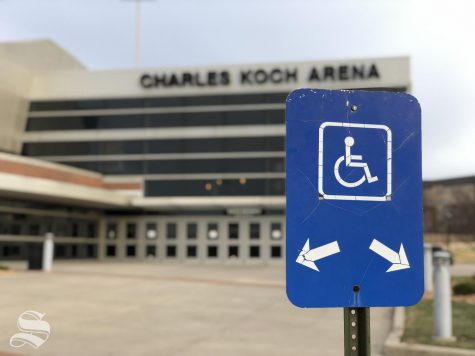Meet Jay Golden: Q&A with WSU’s new president
Jay Golden, who will take over as WSU’s 14th president in January, answers questions during an interview with The Sunflower on Friday morning. The Kansas Board of Regents named Golden the new president on Thursday after a months-long closed search process.
Hours after being named Wichita State’s 14th president, Jay Golden was busy Friday morning meeting with campus stakeholders.
Golden, a vice chancellor at East Carolina University, will move to Wichita with his wife, Dina, in January — when he will take over as president.
Before joining ECU in 2017, Golden worked in various capacities at Duke, Arizona State, and the University of California – Santa Barbara. He also has experience in the private sector as CEO of Golden Environmental Management and vice president at WMX Technologies.
The Sunflower sat down with Golden for 15 minutes on Friday at the Shocker ’70 Room to talk about his vision for the university and to help students learn more about the new president — who was selected by the Kansas Board of Regents after a months-long closed search process.
Responses have been edited for length.
What drew you to Wichita State, and why do you think you stood out from the pool of candidates?
“I followed Wichita State; we’re both in the AAC conference … I had the opportunities to work at some big institutions that are somewhat analogous to a big ship that just doesn’t move very quickly. And in some respect, the private institution I worked at, Duke — they’re not a regional university. So I kind of did some reflection: where is it and what is it that I really want to go?”
“[Wichita State] is a place that has not only a close relationship with, but a close reliance on the community. It’s a place that — whether you call it an access university or an open university — doesn’t focus on selectivity. It focuses on impact for the students and the university itself.”
“Candidly, it’s also a place where [with] my background and my skillsets — which are research, economic development, community engagement, student experiences — I can make the biggest impact.”
“[It’s] hard to answer the second half because I don’t know who the other candidates were … I think maybe what separated me would be my focus … Everything we do from budget to hires to engagement [is about] the student experience.”
“I describe the student experience as a diverse, inclusive, engaged and safe community for all. And most importantly that we’re providing the best academic programs on time for graduation, and with little debt. The other part is enrollment. If we focus on the student experience, and we drive everything toward that, enrollment and all the other good things will happen.”
In your first address to the university, you said that WSU should play a role in protecting and growing the aerospace sector in the region. As president, what will you do to make sure that the everyday student, who may not be interested in aerospace, is included in that vision?
“We’re going to protect that by [making] sure we don’t have any actions or programs that diminish the already existing programs, but we’re going to be very deliberate. I call it ‘convergent science.’ I’m asking the deans, students, chairs and faculty to come together … [and] identify different programs where it requires at least three different departments in different colleges to come together to address big issues.”
“Those could be health disparities, economic disparities, educational disparities or other types of programs. I want to be able to provide a place for everyone on this campus that is for us — for the students and faculty to engage the community on these issues.”
“At Arizona State, we called them interdisciplinary science and technology buildings. Here, I would like to try to find a place that would be a convergent science center, potentially on the Innovation Campus.”
“It could be Spanish linguistics and neuroscience. How do those come together, right? Well it’s cognitive learning and cognitive sciences. That’s going to be the basis in the future for machine-learning and artificial intelligence.”
“I’ve already asked deans and department chairs to be deliberate over the next few months in working across the campus to think through the next new academic programs, research programs, outreach programs that would best prepare our students for careers [and] would also have an impact for our community and our nation.”
“I don’t know what those are; I know my field of research. So I’m going to ask and engage, and we’re going to provide the opportunity for our faculty and our students to go out, not only amongst themselves, but to bring in thought leaders from across the country or across the globe to help us develop those types of programs.”
“Doing those types of things will set the university in motion to understand there’s great value and great benefit in interdisciplinary, multidisciplinary and that everybody belongs.”
You mentioned in your first remarks to the university that you want to increase the diversity of administration and faculty. Could you speak to some of your plans to do that?
“The first one I announced yesterday, which is that I’m going to start the President’s Diversity Leadership Fellowship. I’m going to work with faculty and staff on something that I had initiated at East Carolina University.”
“We need to develop a pipeline. Some people will get into it and say ‘I really don’t want to go into administration,’ and I don’t blame them. But some will go ‘wow, there’s some interesting things that I could bring — a lot of great experience and life experiences.’ So that will be something that I’m going to lead; I’m going to work with different units on campus to help administer it.”
“In its basic form, it is bringing leaders that are diverse by race, ethnicity, [and] backgrounds onto campus to talk about their real-life experiences and the hurdles that they faced. At the same time, to have our faculty and staff have the opportunity to shadow and work with administrators to really get an understanding of what it is that everybody [in administration] is doing on a daily basis.”
“My goal is that we all identify a number of individuals that — if anybody got sick or they go to a new job or whatever — we have the talent pipeline that’s ready to go and wants to come into a leadership position on this campus.”
“For faculty, some things that I’m going to initiate … is have us go to certain universities across the country that graduate high numbers of PhDs that are diverse and think about how we can bring them onto our campus as post-Docs, where they can be exposed to Wichita State, Wichita and the faculty. And the faculty get to be exposed to these great post-Docs, so when we have faculty openings, we already have things in momentum that we’re pulling in a diverse pool of folks.”
You also have stressed the importance of shared governance. What is that vision of shared governance for WSU, and how will you make sure that various groups are being included in decision-making?
“It started today by meeting with the various constituencies, from students, staff and faculty. It’s going to continue on in the sense that, as we start developing ideas for priorities for this institution, those ideas are not going to be top down — but they’re going to be engaged across this campus.”
“Whether it’s thinking about new facilities on campus, new academic programs, investments, budget — it’s making sure there’s representation from students, staff, faculty and administrators at the table from the beginning. Because there’s nothing more disingenuous than saying ‘Here’s our plan, we want you to be engaged and review it.’ It has to start at the very beginning.”
“It’s going to take time; it’s also going to be a culture, so people are going to need to understand that not only am I being genuine in this, but there’s also an expectation that they’re going to be able to commit the time to participate in these things. So it’ll be a learning process for me and for them at the beginning [to] kind of get our cadence and trust and all of that. But that’s how we’re going to move forward.
“I said to all the senates, I don’t care what the structure has been in the past. I want you to tell me how frequently we should meet. I want you to tell me when you have formal meetings when you want me there. I want to meet more frequently than not. I want to be in touch and know what’s going on, and I think that was well received and it’s going to be to the benefit of the university.”

Daniel Caudill is the former editor in chief for The Sunflower. A staffer at the paper since 2017, Caudill first covered Student Government Association...














